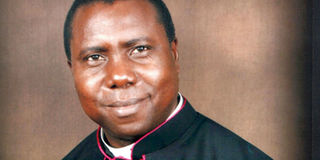Ugandans will achieve free and fair elections through only institutions

What you need to know:
The forthcoming political elections will, evidently, be more of a Machiavellianism showcase.
The recent cultural cum-religious lawful gathering at the Mbogo (Buffalo) clan headquarters would, probably, never have hit the news headlines, were it not for the violent attack against it by State operatives.
Credit given to cultural and religious institutions for collaboratively building Buganda in particular and Uganda in general, is almost taken for granted.
Though a formal apology has been made by government, the incident signalled an enduring distaste and erosion of cultural and religious institutions by the State.
This nature of political engineering is said to be masterminded by the Machiavellian maxim “the end justifies the means”.
Nicollo Machiavelli (1469-1527) was an Italian chancellor and advisor to the Prince of Florence. Discouraged by the continuous turmoil experience in Italy at the time, he taught that when a good leader is in power, he may use any means, good or bad, to hold on to his authority.
This meant divorcing political practice from personal morality, as well as liberating politics from institutions, traditions and customs.
In his book on politics, The Prince (1513), Machiavelli argues for resort to “necessity” or pragmatism in order to excuse actions that might otherwise be condemned as immoral. He contended that the more difficult it is to acquire control over a State, the easier it is to hold on to it.
This would require the ruler to be concerned foremost with the art of war/violence and to seek not merely security, but also glory.
Machiavellianism was exported to England, where King Henry VIII used it to justify his Act of Supremacy over the English Church in 1534, and his subsequent expropriation of monastic lands. Machiavellianism was applied by the protagonists of Marxism and Maoism.
Adolf Hitler applied Machiavellianism to affirm superiority of Aryan Race (“Super Man”) by causing World War II, in which more than 40 million lives perished.
Uganda’s post-independence politics is, evidently, largely influenced by Machiavellianism. In 1966, Milton Obote abrogated the 1962 Constitution, declared himself president, abolished monarchical rule and suspended elections, in the name of forging national unity.
Under the first two decades of the National Resistance Movement (NRA) era, multi- party politics was suspended in preference for individual merit, in the name of averting sectarian tendencies wrought by political parties.
The individual merit political rhetoric has, subsequently and absurdly, engendered a one-man vision, a one-man show, and personality cult, manipulative tendencies, abuse of office, arrogance, pecuniary power, sectarianism, injustices and violence.
The forthcoming political elections will, evidently, be more of a Machiavellianism showcase, with implausible numbers of candidates standing as Independents, than as political party flag bearers.
The main agenda for the Opposition seems to be the removal of the incumbent, hardly giving any meaningful attention to values in offing.
‘The trouble with what we perceive as political parties in Uganda and Africa in general is that they are not institutionalised. What we have are political groupings led by charismatic and popular individuals.
People simply converge and associate or ride on the backs of those who they perceive to be popular. It does not matter whether they agree with them or not,’ writes Nicholas Sengoba, a Daily Monitor columnist.
Whenever Machiavellianism is accepted and followed, the message of I John 5:19: “The whole world lies under the evil one,” applies. The dream for free and fair elections will be achieved only when Ugandans adopt the credible system of institutionalised and disciplined politics.
Such a system grooms leaders, basing on values, thus providing the electorate with reliable choice, and peaceful change of government. Jesus will, then, properly liken us to the wise man who built his house on rock rather than on sand (see Luke 6:47-48).
Msgr John Wynand Katende is a priest. [email protected]





